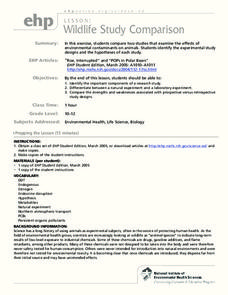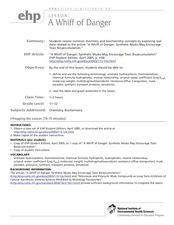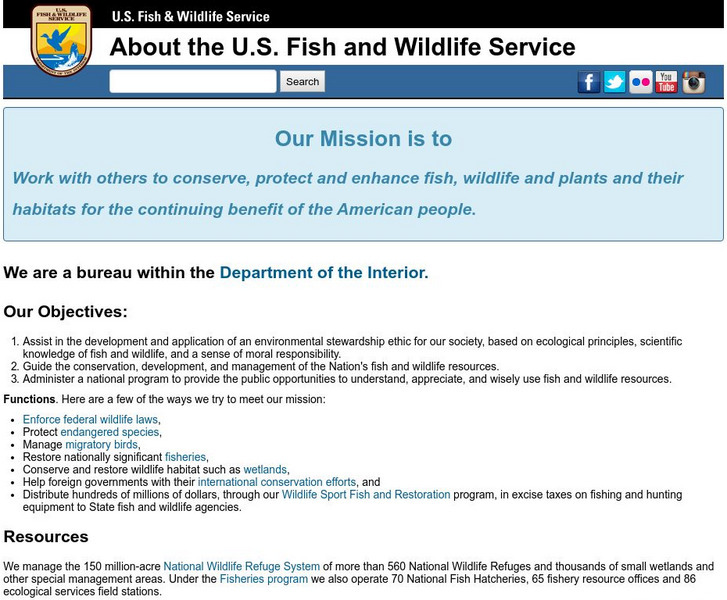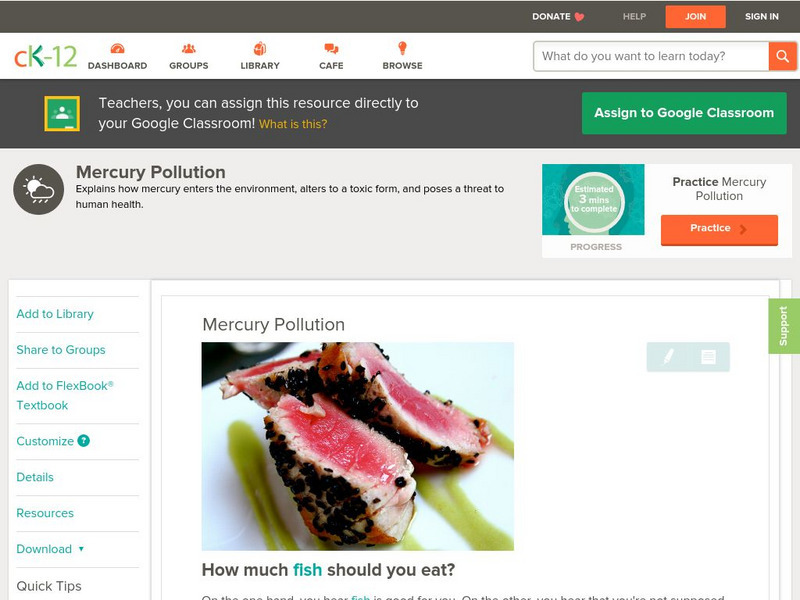Polar Trec
Bioaccumulation of Toxins
In 2015, Peter Cook found that sea lions with high levels of exposure to toxins suffered permanent brain damage if they survived at all. Scholars learn about the accumulation of toxins at various levels of the food chain. Using...
Curated OER
Wildlife Study Comparison
Environmental science classes read articles about two different scientific studies. One is about the effects of contraceptive chemicals on fertility, and the other is about how a pesticide may be reducing bone density in exposed...
Curated OER
Kildare, USA: An Environmental Health Simulation
Your biology class plays the role of epidemiologist when a mysterious illness breaks out in Kildare, USA. Using interviews with doctors, patients, and local citizens, maps, the results from different materials sampling, they work to...
Curated OER
Semipermeable Membranes and Bioaccumulation
Beginning biologists place a drop of food coloring into water of differing temperatures to observe the effect on the diffusion rate. They remove the shells from raw eggs and then experiment with osmosis over the remaining membranes....
Curated OER
A Whiff of Danger
Public health trainees read and write a summary of the article, "A Whiff of Danger". The article is not available through the link, but can be found on the National Center for Biotechnology Information website. After summarizing,...
Curated OER
Water Pollution and Food Chains
Sixth graders study the effect of pollution in our food chains. For this plant biology lesson, 6th graders first experiment with pollution by placing a carnation in colored water. Next they use a food chain triangle to see the...
Other
Pollution Probe: Mercury in the Environment [Pdf]
High levels of mercury exposure can cause birth defects, permanent brain or kidney damage, and/or death. This resource focuses on the impacts of mercury in the environment. Learn how mercury can reap havoc on lakes and other aquatic...
Annenberg Foundation
Annenberg Learner: The Habitable Planet: Ecosystems: Energy Flow Through
Detailed explanation of the processes by which energy flows through an ecosystem. Scroll down and open Section 3.
Georgia Department of Education
Ga Virtual Learning: Ap Environmental Science: Toxicology and Human Health
Students investigate hazards to human health that are found where we live, work, and play, and begin to understand the risk analysis and system of evaluation that was developed to protect us from potential environmental dangers.
US Fish and Wildlife Service
U.s. Fish and Wildlife Service
Outlines the role of the Fish and Wildlife Service in protecting, conserving, and researching the fish and wildlife of the United States. Includes information about the role of DDT and its environmental effects.
US Geological Survey
Mercury in the Geochemical Cycle
Mercury in the geochemical cycle ultimately affects the food chain. Learn about this and its effect on the Everglades.
US Fish and Wildlife Service
Chlorinated Hydrocarbons (Organochlorines) Ddt
Read a brief history of the use of DDT in the United States, its effect on wildlife, and the banning of the toxin in 1972 by the EPA.
CK-12 Foundation
Ck 12: Earth Science: Mercury Pollution
[Free Registration/Login may be required to access all resource tools.] How mercury poses a threat to human health.
BiologyWise
Biology Wise: Understanding the Process of Biological Magnification
Biological magnification is the term used to described the increasing accumulation of substances in organisms as one looks at higher trophic levels in a food chain. When that substance is a toxin, such as a heavy metal or a pesticide,...








![Pollution Probe: Mercury in the Environment [Pdf] Primary Pollution Probe: Mercury in the Environment [Pdf] Primary](https://d15y2dacu3jp90.cloudfront.net/images/attachment_defaults/resource/large/FPO-knovation.png)


